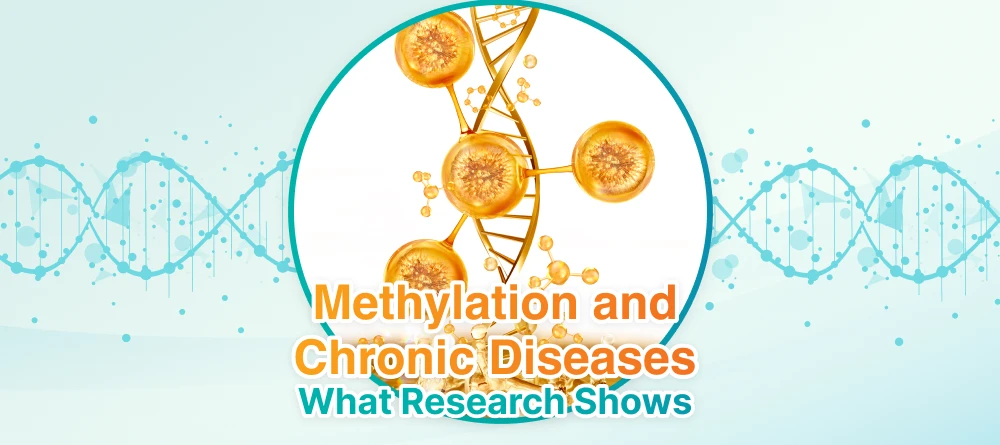Could hidden gene switches be fueling your chronic symptoms? Discover how impaired methylation is linked to heart disease, cancer, and brain decline—and how your DNA holds the key to early detection and prevention with GeneusDNA.
Introduction
Methylation—a process involving the transfer of methyl groups to DNA and other molecules—is one of the body’s most important regulatory systems. While it plays a role in everyday health, research is increasingly linking impaired methylation to chronic diseases, including heart disease, cancer, neurodegeneration, and autoimmune conditions.
In this article, we’ll explore what science says about methylation’s role in chronic illness, and how platforms like GeneusDNA are using DNA insights to enable early detection and preventive health strategies.
The Role of Methylation in Health
Methylation affects hundreds of biological functions, such as:
- Regulating gene expression
- Detoxifying heavy metals and hormones
- Controlling inflammation
- Producing neurotransmitters
- Maintaining cardiovascular balance
When methylation is impaired—due to genetic mutations (e.g., MTHFR), nutritional deficiencies, or environmental stressors—these functions can go awry, setting the stage for disease.
Chronic Diseases Linked to Methylation Imbalance
1. Cardiovascular Disease
- Elevated homocysteine levels, often due to poor methylation, are an independent risk factor for stroke, atherosclerosis, and heart attack.
- MTHFR mutations impair folate metabolism, disrupting homocysteine clearance.
2. Mental Health Disorders
- Conditions like depression, anxiety, ADHD, and schizophrenia are associated with methylation disruptions affecting serotonin and dopamine pathways.
- Genes like COMT and MAO-A regulate neurotransmitter breakdown, directly tied to methylation efficiency.
3. Cancer
- Abnormal methylation can silence tumor suppressor genes or activate oncogenes.
- Research shows that methylation patterns serve as early biomarkers for cancers of the breast, colon, and lung.
4. Autoimmune Diseases
- Impaired methylation can skew immune system regulation, increasing the risk for conditions like lupus, rheumatoid arthritis, and Hashimoto’s thyroiditis.
- Epigenetic inflammation markers are often elevated in these disorders.
5. Neurodegenerative Conditions'
- Alzheimer's, Parkinson’s, and ALS have been linked to poor methylation, oxidative stress, and glutathione depletion.
- Methylation regulates genes involved in neural repair and inflammation control.
6. Metabolic Disorders
- Diabetes and obesity are connected to methylation changes that affect insulin sensitivity and fat metabolism.
What Research Supports This?
- A 2021 review in Nature Reviews Genetics highlighted methylation as a key modifiable risk factor in cardiovascular and neurodegenerative disease.
- Epigenetic testing is now used in clinical trials for cancer screening and targeted drug development.
- The American Journal of Clinical Nutrition emphasized methyl donor nutrients (folate, B12, choline) in reducing homocysteine and inflammatory markers.
How GeneusDNA Enables Early Detection
GeneusDNA’s methylation and genetic testing platform gives users actionable insights by analyzing:
- MTHFR, COMT, and MTRR for methylation capacity
- Detox genes (GST, CYP450) for toxin resilience
- Inflammation and immune regulation SNPs
- DNA methylation age and biological stress markers
With this data, GeneusDNA creates a personalized disease prevention plan, including:
- Diet and supplement protocols
- Homocysteine and inflammation risk reduction strategies
- Sleep and stress management tailored to your neurobiology
Why Early Intervention Matters
Methylation patterns change before symptoms appear, making them powerful early-warning indicators. Detecting these shifts lets you intervene before disease takes hold.
- Optimize methylation = Reduce risk of disease
- Manage inflammation = Protect the brain and heart
- Support detox = Prevent accumulation of toxins that fuel chronic illness
Conclusion
Methylation is more than a molecular process—it's a central health regulator. From heart disease to mental health and cancer, the research is clear: methylation status matters.
Thanks to innovations in epigenetic testing, providers like GeneusDNA make it possible to identify your risks and build a proactive plan that supports long-term vitality.
Written by: Dr. Arnond Kitnitchee


